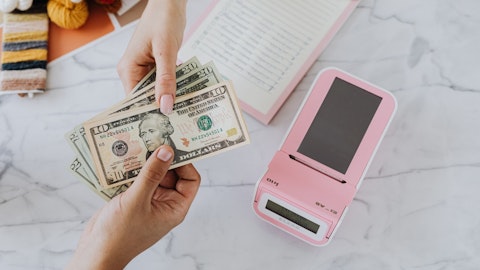Steve Horn: No. We still have, it’s three Bed, Baths and we still have them because they are fabulous real estate. And they were not on the initial list of Bed, Bath closures. They may be in the future, but they are good real estate. So, we will be able to replace that and we are very comfortable with that. And then you are right. The one Regal we had in Chicago land, we are getting good interest with that asset as well.
Wes Golladay: Got it. And just for Kevin, since you nailed the bottom on rates by issue with a lot of long-term debt, I know that you are having a big, I guess willingness to have more floating rate debt, I guess you recall for rates to go lower.
Steve Horn: Yes. I wouldn’t probably underline Kevin’s call for rates to go lower, but boy, that’s kind of edgy for me. But no, we just €“ like I said, we have the luxury of being able to pivot the shorter term variable rate debt until the market sort themselves out and re-price a bit. And so we are going to €“ that’s the way we are going to dig in this environment. But we will see if rates go lower. They don’t have to for our model to work just fine, to be quite honest. But we don’t feel any real pressure to be issuing bonds in this market, and we have the luxury of not needing to.
Wes Golladay: Got it. Thanks everyone.
Steve Horn: Thanks.
Kevin Habicht: Thanks Wes.
Operator: Thank you very much. Your next question is coming from Tayo Okusanya from Credit Suisse. Tayo, your line is live.
Tayo Okusanya: Hi. Good morning. Just kind of given some of the conversations around kind of retailer credit and credit losses and things of that nature, are you guys doing anything different from an underwriting perspective or even just from a credit monitoring perspective to kind of ensure that if this worst-case scenario happens, you guys at least kind of make it out okay. Is anything changing?
Steve Horn: No. I mean the beautiful thing about NNN’s business model is, we are real estate first. And while we understand credit is important, who our tenant is, at the end of the day, if you are near market rent, your downside, if you buy a highly desirable real estate and market rent, you can replace that cash flow. And in essence, that’s our underwriting. And then you do the relationships. This is kind of where our business model gets a little difficult to understand. There is a self-selection process. When we do a sale leaseback, a tenant doesn’t want to sign a 15-year, 20-year lease with high rents. They want low rent to ensure they can pay that rent for 15 years to 20 years. So, there is a self-selection process. So, we are very comfortable with our underwriting. As you saw kind of during the great financial crisis or during the pandemic, we have maintained the rent paying ability of the tenants. So, yes, we are not shifting yet.




